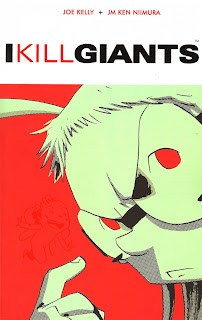I Kill Giants,
written by Joe Kelly and drawn by JM Ken Niimura, tells the story of Barbara, a
fifth-grader who wears rabbit ears and carries a heart-shaped purse named
Coveleski. She lives with her brother and an older sister who takes care of
them both. And she kills giants.
Barbara doesn’t have many friends, and the school
psychologist takes a special interest in her. But not just because of her
avowed giant killing. Something has happened to Barbara, something so upsetting
that she refuses to talk about it.
Rather than drawing excitement from the question of whether
Barbara’s giants are real, the true tension comes from the slow revelation of
the devastating real-life tragedy that Barbara is escaping by subsuming herself
in fantasy. And the reader doesn’t get to find out what it is until Barbara is
ready to admit it to herself.










